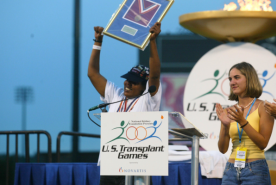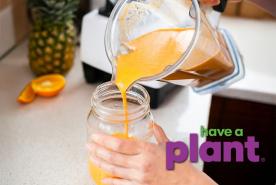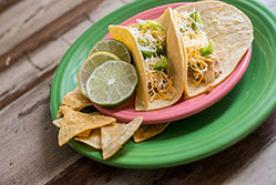Many people have been led to believe that you can’t be a vegetarian or follow a mainly plant-based diet if you have kidney disease. But recent studies suggest that people with kidney disease can follow a plant-based or vegetarian diet if they know how to do it wisely. These types of diets may help lower the chance of getting kidney disease, or even keep early kidney disease from getting worse.
What is a plant-based diet?
It means eating mostly whole grains, fruits, vegetables, legumes (beans, peas, and lentils), unsalted nuts, and healthy oils, while reducing animal foods such as dairy, eggs, fish, meat, and poultry. To make a plant-based diet as healthy as possible, you also avoid processed foods like many types of canned foods and soups, refined grains (white breads and pasta, highly processed or high sugar cereals, white rice), snack-foods (potato chips, cookies), and sugar-sweetened beverages. Foods that have animal products like pizza, meat or cheese-based soups, and mayonnaise are also avoided.
Plant-based diets have become very popular in recent years. They are rich in fiber, vitamins, and minerals that help lower your risk for heart disease and other health problems. Studies suggest they may even help keep your kidney disease from getting worse. Some popular, well-known plant-based diets are:
- The Mediterranean diet. This is a diet typical of many Mediterranean countries, such as Italy and Spain. It consists mainly of cereals, grains, vegetables, beans, fruits, and nuts, along with moderate amounts of fish, cheese, olive oil, yogurt, and little red meat.
- The DASH diet. This diet is often recommended for people with high blood pressure. It consists of eating fruits, vegetables, low-fat dairy foods, whole grains, fish, poultry, and nuts. It also limits sodium (salt), sweets, sugary drinks, red meats, and foods that are high in saturated fat, cholesterol, and trans fats.
- The MIND diet. This diet combines the Mediterranean diet and the DASH diet to create a diet that focuses on brain health. Green leafy vegetables, berries, nuts, olive oil, whole grains, fish, beans, and poultry are the main focus.
Can I follow a plant-based diet if I have early kidney disease?
Yes. In fact, you may benefit from a plant-based diet if you have early kidney disease. Studies show it can:
- Help you keep a healthy weight. Plant-based foods usually have fewer calories than animal-based foods.
- Lower blood pressure and cholesterol, which helps reduce your risk for heart disease. Did you know that having kidney disease puts you at risk for heart disease? In fact, over 50% of people with kidney disease develop heart disease. Why? Among other things, healthy kidneys help control blood pressure. But if your kidneys cannot do this well, you may get high blood pressure. Over time, high blood pressure can lead to heart disease and cause further damage to your kidneys. A plant-based diet also helps your heart in other ways – by lowering “bad” cholesterol and helping control weight gain.
- Lower your risk for diabetes. Healthy, plant-based foods have been shown to help your body use insulin better. Insulin is a hormone that controls how much sugar (called “glucose”) is in your blood. Having too much sugar in your blood can lead to diabetes. And having diabetes can make your kidney disease worse. What if you already have diabetes? Plant-based diets have been shown to help keep blood sugar in check.
- Improve antioxidant levels. Antioxidants are compounds found in food that help protect your cells from damage. They are abundant in plant-based foods, such as fruits and vegetables. Vitamin C and E are examples of antioxidants.
- Help keep your kidney disease from getting worse.
- Some studies suggest that by lowering your risk of heart disease, diabetes, “bad” cholesterol, and weight gain, a plant-based diet can help slow or stop kidney disease from getting worse.
- When you have kidney disease, acid can build up in your blood. This acid load can make kidney disease worse. Eating less animal-based foods can lower the acid load and put less stress on your kidneys.
- Plant-based foods that are not highly processed, such as fresh vegetables and whole grains, have phytates. Phytates can bind phosphorus, so you don’t absorb as much phosphorus as you would from highly processed foods, or from dairy-based foods such as cheese and milk. In kidney disease, phosphorus can build up in the blood and cause harm to bones and blood vessels.
What if I have kidney failure?
If you have kidney failure, you may still be able to follow a plant-based diet – if that is what you want. But you must make sure you are getting the right nutrients in safe amounts. Nutrients are chemicals you get from food that help you stay well.
A dietitian can help you create a meal plan that works for you. Why consult a dietitian? Studies suggest that a plant-based or vegetarian diet may have certain health benefits, but it may also have some risks for people with kidney failure. Having kidney failure puts you at risk for poor nutrition (called “malnutrition”). One reason this happens is from the dialysis process itself. Unfortunately, some proteins are lost during dialysis. Weakness, low energy, loss of muscle mass, poor health, and decreased quality of life can result. To lower the risk of poor nutrition, you may have been told to include some protein-rich animal products in your diet. You may also have been told to limit fruits, vegetables, and whole grains, which helps control potassium and phosphorus levels in your blood.
That’s good advice. But what if you have religious, cultural, or ethical reasons for wanting to follow a plant-based or vegetarian diet? That’s where a dietitian can help. By planning your meals carefully, you can still get the right nutrients in safe amounts. In fact, there may even be some advantages to plant-based meals for people with kidney failure. According to one recent study, dialysis patients who followed a vegetarian or plant-based diet had:
- Lower blood pressure
- Higher antioxidant levels, especially vitamin C, vitamin E, and B-carotene
- Less protein in the urine
- Less inflammation (swelling)
- Better insulin sensitivity (able to use their body’s insulin better)
- A lower risk for heart disease
Talk to your healthcare team if you are interested in a vegetarian or plant-based diet. By working together, you and your healthcare professional can create a meal plan that works for you.
What else should I know?
There is no one diet that is right for everyone with kidney disease or kidney failure. What you can and cannot eat will change over time, depending on how much kidney function you have and whether you have other health problems like diabetes or heart disease. That’s why it’s so important to talk to your healthcare team or a dietitian. Ask whether a plant-based diet is right for you. Your healthcare team can refer you to a dietitian with special training in kidney disease.
Want an easy way to start eating less meat? Go Meatless Monday every week, and get regular tips and recipes by following #MeatlessMonday and learning more at MeatlessMonday.com.











